A week of action at the World Health Assembly
The END Fund’s goal during the recent World Health Assembly, – a convening that brings together important decision makers in the health space- was to foster stronger partnership and build momentum on how the neglected tropical disease sector can align to streamline activities in response to the shifting global aid landscape. We are excited to share some highlights from the END Fund’s week at the World Health Assembly:
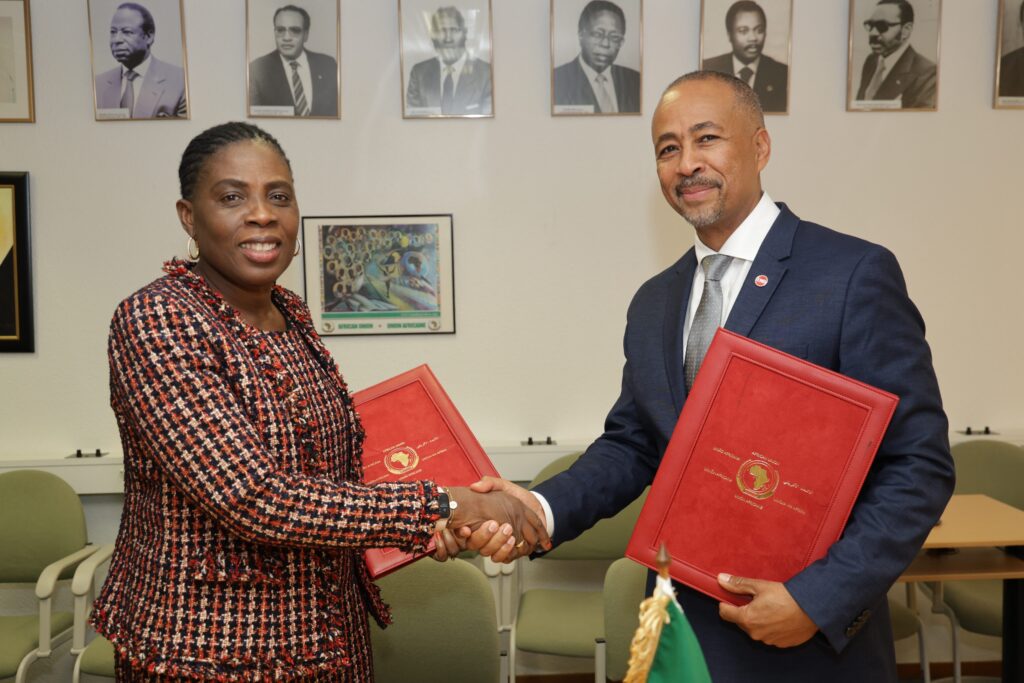
A memorandum of understanding to end neglected tropical diseases with the African Union Commission
The END Fund and the African Union Commission signed a three-year memorandum of understanding to support efforts towards the elimination of neglected tropical diseases in the African region. The African Union Commission was represented by Commissioner for Health, Humanitarian Affairs and Social Development Ambassador Amma Twum-Amoah and the END Fund by the CEO, Dr. Solomon Zewdu MD.
“Collaborating with the African Union Commission is not just a programmatic necessity but a means to elevate the constitutive act of the commission of increased cooperation and integration of African states to drive Africa’s growth and economic development,” said Dr. Solomon Zewdu, the END Fund CEO. “One that will never materialize unless we restore the dignity and close the inequity gap of the poorest and most marginalized communities on the continent where NTDs are left unattended.”
The agreement advocates for strengthened integration of neglected tropical disease activities into primary healthcare services and the inclusion of neglected tropical diseases into the universal health coverage package delivered by community health workers.”
The partnership with the END Fund will support the realization of the One Stop Shop approach for NTDs, as outlined in the AU Roadmap to 2030 & Beyond. This approach streamlines interventions by integrating NTD services into primary healthcare systems, reducing fragmentation, enhancing efficiency, and ensuring sustainable domestic financing,” said Ambassador Amma Twum-Amoah, Commissioner for Health, Humanitarian Affairs and Social Development, African Union Commission.
“Key components include: One Plan, One Budget, One Approach—aligning national strategies to optimize resources and avoid duplication; integrated service delivery—embedding NTD interventions within broader health programs to improve accessibility and effectiveness; Strengthened domestic funding mechanisms—to secure long-term viability; and support for regional production of medicines, vaccines, and diagnostics—to enhance affordability and availability,” concluded Ambassador Twum-Amoah.
“NTD elimination is a collective effort among multiple stakeholders,” said Carol Karutu, Vice President of International Programs at the END Fund, “This MOU between the END Fund and the African Union Commission provides a platform to strengthen advocacy with African Union member states, philanthropy, private sector and the communities that are directly impacted by these diseases.”
MerCk celebrates 5 Billion treatments donated
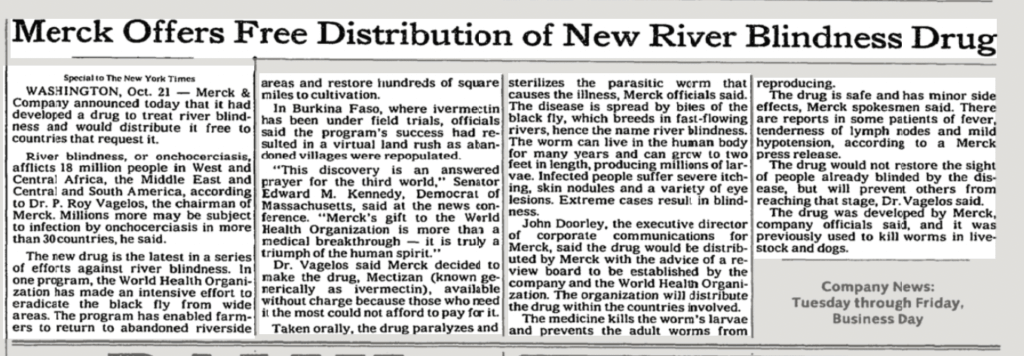
In the 1980s, a scientist working for Merck found that a drug called ivermectin was effective at treating a disease that was debilitating entire communities in Africa. In some parts of the continent, more than 50 percent of towns were experiencing the severe symptoms of blindness or extreme itching from onchocerciasis, which causes irreversible blindness if left untreated. Until this point, the only effective response was to kill the black fly, which spread the disease, or abandon fertile land where the black fly lived.
Merck made the bold decision to manufacture and donate the medicine to treat the disease for as long as needed to achieve elimination. Since then, the company has donated 5 BILLION treatments and the results have been staggering. Countries have been able to build long term strategies that prevent disability and blindness.
“We have reached this incredible milestone that we could not have achieved without engagement from the global community, communities and governments from around the world. We have reached over 62 countries with these treatments,” said Allison Goldberg, President of the MSD Foundation.
A report from Niger, the first country to eliminate onchocerciasis in Africa, found that the success led to $2.8 billion USD of increased economic gains because fertile lands were able to be re-settled, workers without symptoms were more productive, and there were less people leaving the workforce to take care to care for sick relatives. Now several more countries are on the precipice of reaching the milestone – an impossibility without this historic donation program.
Partners join roundtable to advance collaborative financing
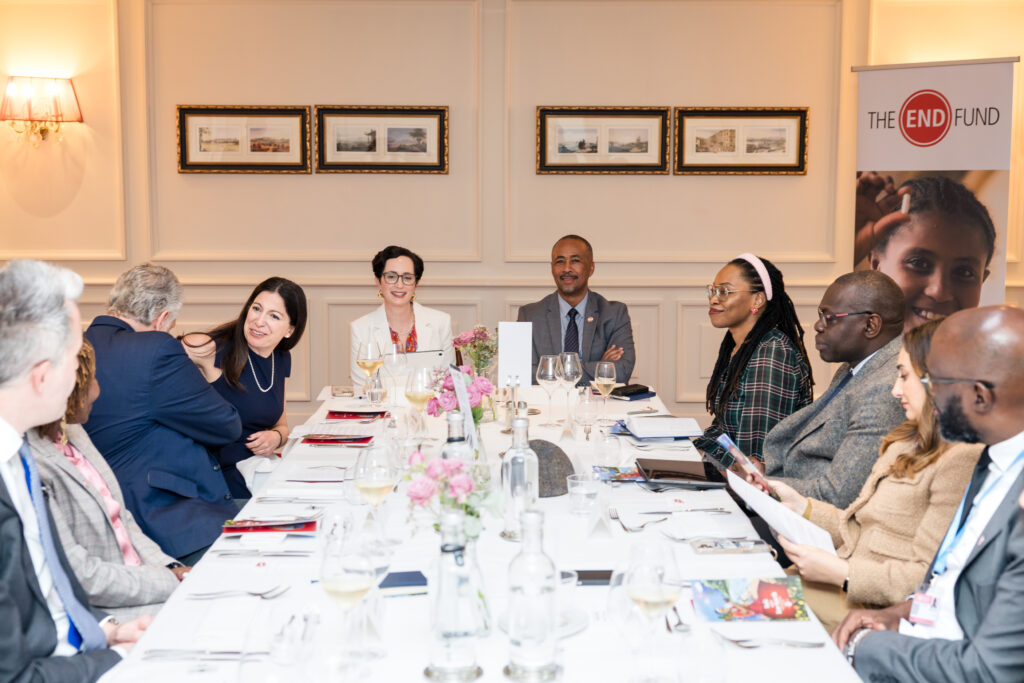
The END Fund and Devex hosted a roundtable to discuss the pivotal role of philanthropic investment and strategic partnership to eliminate neglected tropical diseases. Participants shared insights about the need to strengthen current partnerships and suggested ways to amplify the role of philanthropic and private capital in supporting country-led health initiatives.
The discussion focused on private philanthropy as a practical and catalytic tool to empower communities and de-risk health investments, ensuring that health is established as a prerequisite for sustainable development. The discussion also took note of how instability provoked by climate change and shifting development assistance has created a need to reinforce effective and impactful partnerships among the NTD community partners, philanthropic capital, and private corporate resources.
Celebrating Mauritania officially eliminating trachoma
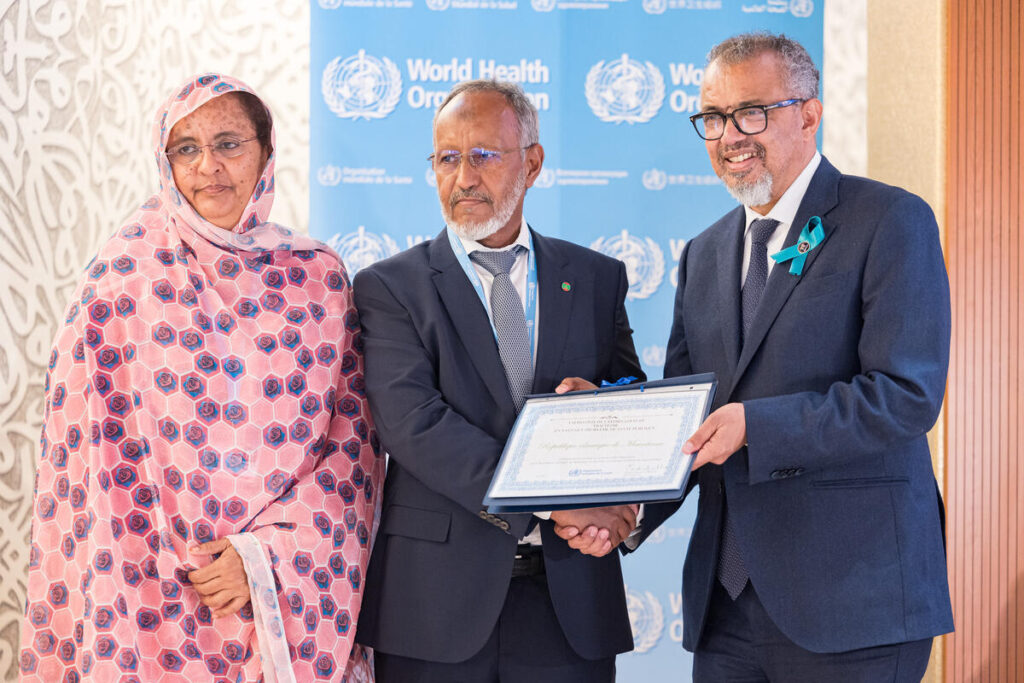
During the week, the WHO officially validated Mauritania as having achieved elimination of trachoma as a public health problem. This accomplishment—driven by sustained national leadership, strategic partnerships, and timely technical support—makes Mauritania, only the seventh African nation to reach this goal.
The elimination effort dates back more than two decades when targeted control measures began in earnest. Their effort stands as a testament not only to what persistence and collaboration can achieve, but also to a national commitment that has quietly transformed the country’s public health landscape. The END Fund is proud to have played a part by funding assessment surveys and helping the government to prepare the official dossier of elimination for the WHO.
Six African nations sign agreement to cooperate over visceral leishmaniasis
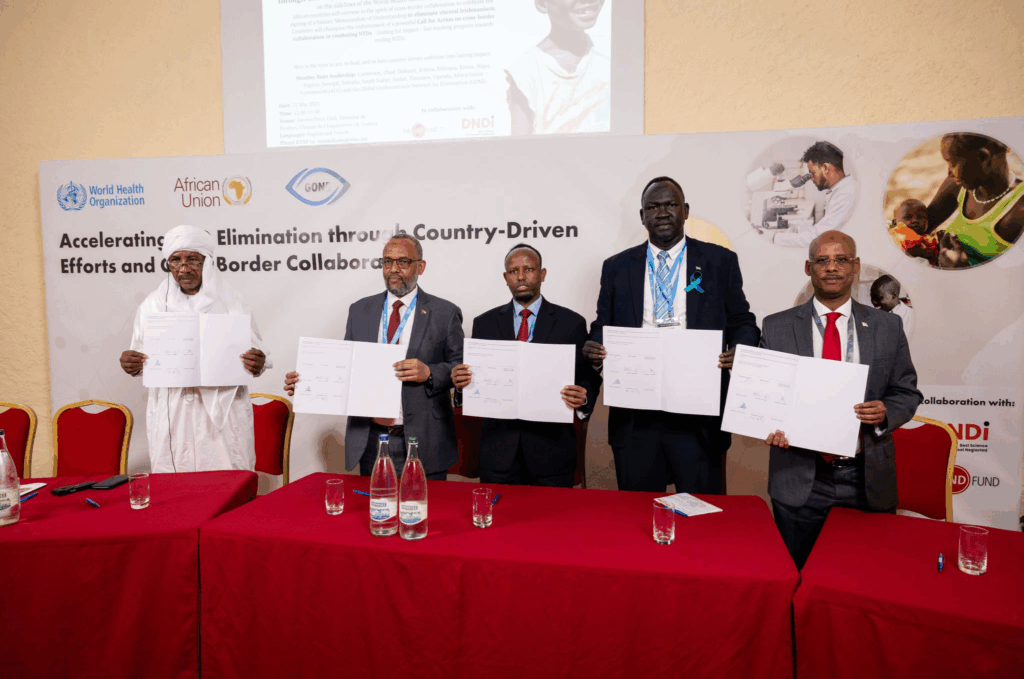
Health leaders from Chad, Djibouti, Ethiopia, Somalia, South Sudan, and Sudan united to sign a landmark memorandum of understanding to eliminate visceral leishmaniasis, one of the world’s deadliest neglected tropical diseases. 74 percent of its global burden is found in East Africa. If left untreated, it leads to death in 95 percent of patients who have symptoms.
The countries agreed to invest resources, develop effective policies, and collaborate closely to achieve the ambitious targets outlined in the visceral leishmaniasis strategic framework launched in June 2024.
“Cross-border collaboration is essential for NTD elimination because these diseases don’t recognize borders, and neither should our collective response,” said Dr. Solomon Zewdu MD, CEO of the END Fund. “What we’re seeing with the visceral leishmaniasis memorandum of understanding and the call for action represents the kind of country-led, coordinated approach that leverages local ownership and maximizes our limited resources. By working together across borders and shared measurement systems, we can eliminate wastage and duplication while accelerating our path toward an NTD-free Africa by 2030.”
The commitment of East African nations to tackle this deadly parasite head-on through unified action sets a compelling precedent for accelerating the elimination of other devastating neglected tropical diseases.
Innovative financing comes to the front in changing funding landscape
The funding landscape for global health has shifted dramatically in a short time. In order to meet the current needs, the sector’s focus will need to change rapidly, too. At an event hosted by the International Society for Neglected Tropical Diseases, END Fund VP of Global Strategic Partnerships, Sam Macintosh, discussed how the global community can meet this moment, “In this shifting landscape, we have a pivotal opportunity – to support African leadership and innovation with unity and strategic partnerships that fuel sustainable and reliant health systems.”
Among such partnerships, the role of the pharmaceutical industry stands out. In his remarks at the event, Harald Nusser, Merck KGaA’s Head of Global Health and Health Equity, reinforced the need for stronger coordination, efficiency, and joint planning among global NTD stakeholders, from drug manufacturing through to their effective delivery.
Investable Opportunities: Providing Deworming Treatments for Madagascar’s Youth
The END Fund has been supporting Madagascar’s deworming activities alongside partners such as Unlimit Health, Bruyere Research Institute, and WHO/ESPEN since 2020. With much progress made in tackling these diseases, Madagascar has recently shifted its goal from controlling intestinal worms to eliminating them by 2030. In 2024 alone, we supported deworming treatment for over 9 million children and assisted with critical remapping to enhance treatment targeting as Madagascar moves toward elimination goals.
Continued support is essential to sustain this momentum and ensure long-term success. As such, we’re currently seeking to fulfill a $1.45 million investment opportunity to support this program.
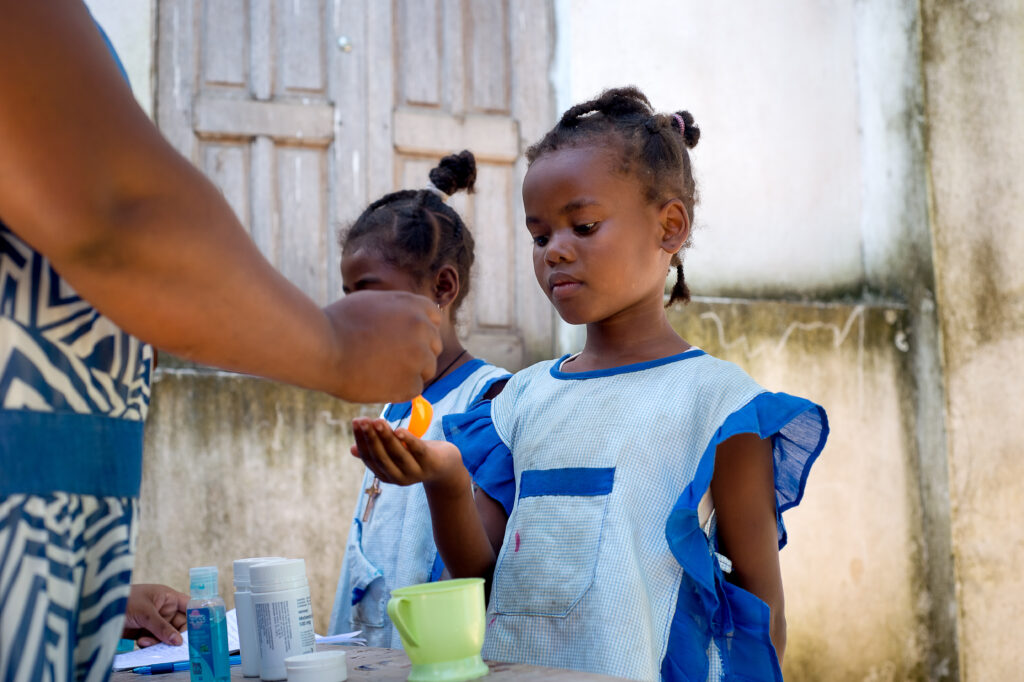
Deworming is proven to be one of the most high-impact and cost-effective health and education interventions to invest in, with treatments shown to improve school attendance by up to 25 percent. At an average annual cost of less than $0.50 per child, investments to ensure Madagascan children can access vital treatments will have a profound impact on the country’s youth, helping unlock the countless opportunities associated with improved health and educational attainment. In 2025, we’re aiming to support 5.4 million children with deworming treatments.
If you wish to support this opportunity, you can find more details on how to do so here.

